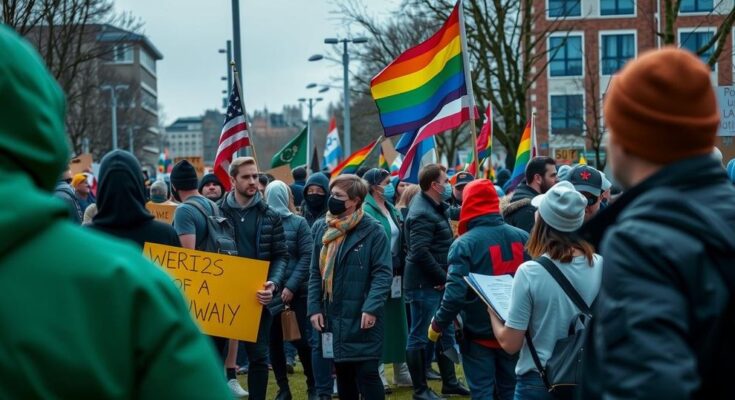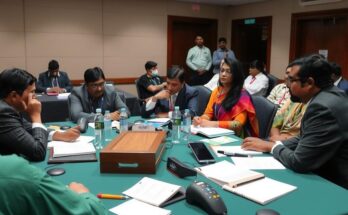Climate-threatened nations expressed their dissatisfaction at the COP29 conference by protesting the proposed climate finance deal, which they deemed insufficient in light of their urgent needs. Led by representatives from small island and impoverished African states, delegates exited negotiations, pressing for a more equitable agreement from wealthier nations, which have committed to raising funding to $300 billion by 2035.
During recent discussions at the UN COP29 conference in Baku, climate-vulnerable nations expressed their dissatisfaction by exiting negotiations over a finance agreement that they deemed insufficient. Led by representatives from small island states and impoverished African countries, delegations voiced their frustrations about the financial support being offered, which many feel does not meet the urgency of their climate challenges. Cedric Schuster, the chair of the Alliance of Small Island States (AOSIS), emphasized the need for a fair deal, stating, “We’ve just walked out. We came here to this COP for a fair deal. We feel that we haven’t been heard.”
The proposed finance deal included a commitment from developed nations to increase funding to $300 billion by 2035, a revision from an earlier offering of $250 billion that had been heavily criticized as inadequate. Developing countries argue that they require much higher sums to effectively combat climate change and to bolster resilience against its effects. U.S. Climate Envoy John Podesta remarked, “Hopefully this is the storm before the calm,” amidst ongoing efforts to reach a consensus.
The confrontation at COP29 underscores the challenges related to climate financing, particularly as nations debate the mechanisms for distributing funds fairly in light of escalating environmental crises. As negotiations continued, it was evident that a resolution was imperative, with numerous officials expressing concerns over the limitations of the current proposals. “No deal is better than a bad deal,” warned Ali Mohamed, the Kenyan chair of the African Group of Negotiators, echoing the sentiment of many in attendance.
Despite continuous pressure from activist groups and cooperative negotiations led by representatives of wealthier and emerging economies, the discussions remain fraught with disagreement. Activists highlighted the obligation of historically significant polluters to accept greater accountability for funding climate initiatives, especially in terms of assisting less developed regions. While expectations for a comprehensive agreement loom large, the upcoming endorsements or rejections from 198 nations present a critical moment for climate policy.
The COP29 conference represents a vital forum for international negotiations aimed at addressing climate change, particularly through the mechanisms of climate finance. Countries most vulnerable to climate disasters, such as small island nations and economically disadvantaged African states, often face existential threats from rising sea levels and extreme weather, necessitating robust financial support from wealthier nations. Despite ongoing discussions, disparities in expectations and commitments between developed and developing countries have resulted in heightened tensions, highlighting the challenges in securing equitable financial agreements for global climate action.
The protests at COP29 highlight the urgent need for a comprehensive and equitable climate finance agreement that acknowledges the financial and existential threats faced by vulnerable nations. As negotiations resume, the capacities of wealthier nations to fulfill increased funding commitments will be instrumental in shaping the future of global climate strategy. The outcome of these discussions will unequivocally impact the global fight against climate change and the resilience of the most affected regions.
Original Source: www.fox28spokane.com




